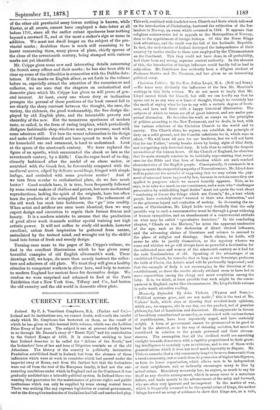Christian Politic.% By the Rev. Julius Lloyd, M.A. (Ball and
Sons.) —We trace very distiuctly the influences of the late Mr. Maurice's writings in this little vohnue. We do not mean to imply that Mr. Lloyd cannot think for himself, but stilt we can hardly say that he opens out to us any very new lines of thought, though he certainly has the merit of saying what he has to say with a certain degree of fresh- ness, and here and there with a happy historical illustration. The subjects of which he treats are all of groat interest, and are under per- petual discussion. He describes his work as essays on the principles of politics according to the Now Testament, and ho deals, in fact, with the various relations of the Christian Church to the world and to society. The Church alone, he argues, can establish the principle of duty on a solid ground, and the Conatist substitute for it, which says in effect, " We will have all men for our brethren, but we will not have God for our Father," utterly breaks down by losing sight of filial duty, and recognising only fraternal duty. It fails thus to satisfy the deepest necessities of the human heart. Of the Chinch of England, he observes that its main strength consists in its faithfully representing that rever- ence for the Bible and that love of freedom which are such marked characteristics of the English people. Consequently, it commands in a large measure the respectful sympathy of Nonconformists. Mr. Lloyd does well to point out the mistake of supposing that we may refuse the pay- ment of rates and taxes imporrod by law, because in certain cases they are applied to purposes which we cannot heartily approve. This, as he says, is to take too much on our consciences, and a man who " challenges persecution by withholding legal duties" must not quote the text about "rendering to Caner the things which are Crones," &c., a text which people have certainly often " wrested to their own destruction," and to the grievous injury and confusion of society. In discussing the re- union of Christendom, Mr. Lloyd holds very decidedly that the only possible way to such a consummation must bo through a groat widening of human sympathies, and an abandonment of a controversial attitude on what may be called " speculative doctrines." In his concluding chapter, " Clouds on the Horizon," he notes the apparent tendencies of the age, such as the declension of direct clerical influence, and the advancing claims of literature and science to succeed to the place of religion and theology. Such claims, ho holds, will never be able to justify themselves, as the mystery whence we come and whither we go will always have as powerful a fascination for the cultivated men and women of the nineteenth century as it had for the rude Northumbrian of old. Speaking of the advantages of an established Church, ho remarks that so long as our Sovereign professes the faith of Christ, the Asiatic mind will be profoundly impressed ; and that the example of Italy is not encouraging in the direction of dis- establishment, as there the results already attained seem to have led to more superstition among the clergy and more scepticism among tho laity. It is, we think, at least possible that such might be the conse- quences in England, under like circumstances. Mr. Lloyd's little volume is quite worth attentive reading.






























 Previous page
Previous page